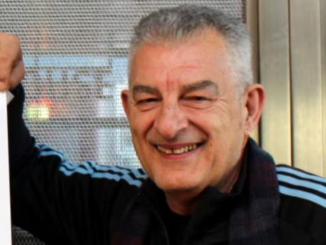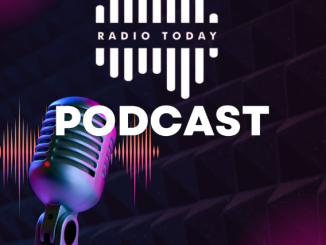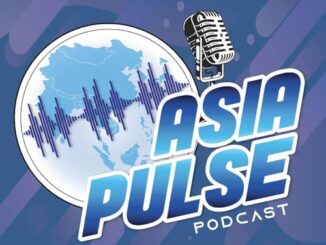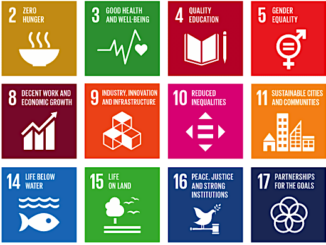
Power Outage As Bull Charges Into Waco
Waco Entertainment Group flipped CHR “Power 108” KWPW Robinson/Waco TX to Classic Country on Saturday. […]

Waco Entertainment Group flipped CHR “Power 108” KWPW Robinson/Waco TX to Classic Country on Saturday. […]

Radio is paying tribute to one of the entertainment industry’s great all-rounders in Lex Marinos, following his death at the age of 75.Heavily involved in radio throughout his life, Lex began his media career in the 1970s, as a producer and presenter on 2JJ and 2JJJ, the precursors to Double J and triple j.Over the… Read More
The post So talented, yet so humble: Radio remembers Lex Marinos by Sarah Patterson appeared first on Radio Today. […]

It’s been another big week in radio, and in this latest ep of the Radio Today podcast, Jen brings us up to date with the latest movements, including Mike Sneesby stepping down as Nine CEO.There’s also news from Radiodays Asia, the latest Triton Digital Australian Podcast Ranker and the upcoming CBAA Awards.And our Song of… Read More
The post Radiodays, rankers and the latest radio movements by Sarah Patterson appeared first on Radio Today. […]

The French audio specialist and equipment manufacturer Digigram has announced the release of a new Dante sound card as part of its ALP-X range. Launched at IBC Amsterdam 2024 and available from Digigram’s network of distributors early October 2024, ALP-DANTE-LE is the eighth addition to the fast growing range of sound cards launched in 2022.
Capitalizing on the success of the ALP-DANTE, Digigram has developed ALP-DANTE-LE, a lighter version of the PCIe sound card that benefits from its most prominent features.
ALP-DANTE-LE was designed using the same sturdy hardware platform as the rest of the ALP-X range, whose proven design is a synonym for legendary reliability. The card also features the famous low-profile form factor, coupled to a fanless design to address audio applications where space and reliability are at stake. ALP-DANTE-LE operates under Windows and Linux drivers and is compatible with AES67 and SMPTE 2110-30 protocols, increasing its versatility to address countless applications regardless of the environments. Lastly, the card seamlessly integrates Dante networks thanks to the usual Dante Controller interface, and Digigram’s signature reliability and low latency coupled with the audio quality inherent in the Dante protocol.
ALP-DANTE-LE capitalizes on Digigram’s decades of expertise and naturally comes as the new extension of the ALP-X family, while being a cost-effective addition to the range.
“We have concentrated all the acclaimed benefits of ALP-DANTE in its lighter version ALP-DANTE-LE, and kept the main functionalities that are essential to most projects where audio is critical. The slim form factor, Dante compatibility with other protocols, 64 channels in and 64 channels out, plus support for Linux and Windows operating systems – are among the card’s highlights” states Stéphane Bert, Digigram’s Presales Manager.
ALP-DANTE-LE comes with adjusted connectivity, while keeping the same number of channels. This optimized card will power a larger array of 365/24/7 run applications that require recording, playout or real time processing.
“It is important for Digigram to cater to all of our customers’ projects, regardless of the application or budget, and provide them with untouched quality. All these benefits now come at an optimized price for improved cost-effectiveness,” concludes Bert. […]

Asia Pulse is an Asia Collective podcast series hosted by Elliott Danker in collaboration with M Group Asia, which take a look at what’s behind the pulse of Asia right now.This weekly show aims to advise on business strategy in the region, with a focus on geopolitics, tech and business expansion within Asia.Topics include defence cooperation and partnerships, Singapore’s place in ASEAN, cybersecurity and AI as well as growing a global leader. Audiences will be able to lean into insights to what businesses are thinking about when considering regional expansion and also see the link between geopolitics and how it affects trends as well as business considerations.The show provides a good mix of industry experts and academics and you are able to get the different types of opinions from the experts as well as the tough questions that academics tend to ask.Danker, who hosts the show, I left the radio scene after close to 20 years. He has pivoted several times within the media industry in Singapore from starting as a broadcast journalist to pop radio to sports tv and also as a part of the start-up team for Money FM 89.3 where he anchored the morning drive time show for over five years.After leaving the stations earlier this year, he started his own media consultancy with an aim to help businesses build their brand through podcasting.Danker says: “I believe that the data analytics that you can get from podcasting represents a more accurate way of building your content as well as meeting the clients’ needs. In the world of “on demand” podcasting represents an opportunity as there is a low barrier of entry and the convenience of the “pause button” is something that appeals to consumers. They are able to multitask while listening to the podcast and are not bound to their driver’s seat to only be able to complete content while driving like how radio tends to depend on. The ease of sharing a podcast via social media is also a great way to gain new audiences and of course, it makes access to guests so much easier. With that in mind, I think podcasting is a great tool for brands to build and reach audiences as a great marketing tool.” […]

In a workshop on Sustainability at Radiodays Asia 2024, Steve Ahern led participants through a series of exercises to help them plan the evolution of their businesses for a cleaner and more profitable future.The workshop focused on the UN Sustainability Goals as a template for change, focusing not just on carbon emissions, but many other aspects of sustainable broadcast businesses.A big picture approach to sustainability includes people, power, programming, production and premises. Ahern is Chair of the Australian audio industry working group on sustainability, called Green Ears.The most significant area for most radio broadcasters is power use and emissions at their transmitters. The workshop explored how UN goals 7, 9, 12 and relate to energy usage and climate, exploring examples of companies that are actively working to reduce energy usage at transmission sites.The most significant example was ABC Australia’s largest AM transmission sites, the ABC Radio Sydney and RN transmitters at Liverpool, where two massive 50kW transmitters are beaming out strong signals 24/7. With a modern approach to efficient energy management by transmission provider BAI, the transmission site has delivered a 17% reduction in emissions since using Modulation Dependent Carrier Control (MDCL) on its Nautel NX50 transmitters and Marconi 224 metre antenna mast.For each 50 kW transmitter, the annual benefit has been assessed as:
234 MWh reduced energy consumption
310 tCO2e reduced emissions, based on FY23 NSW grid emissions factors
Emissions reduction is equivalent to:
1,717,000 km of average new passenger vehicle driving in Australia
5,126 tree seedlings grown for 10 years
In Australia, SBS has also just signed a renewable energy agreement with a new provider, while Nine Entertainment and Southern Cross Austereo are including their sustainability activities in their annual reports as part of increased accountability.In Singapore, Mediacorp has modified its buildings to embrace renewables. In Malaysia, Bfm (pictured below) is working with its clients and business-focused listeners by holding coffee club seminars to help Malaysian businesses understand how to be more sustainable and how to report their activities.The workshop also examined how Italy’s national broadcaster RAI, CBC Canada and the BBC are working across their whole organisations to embed sustainability into all aspects of their media businesses.Streaming is another area where broadcasters are increasingly holding their suppliers to account for energy usage. In the workshop, All In Media’s Richard Phelps explained how simple tweeks to apps can be more efficient, such as not requiring location services to be continually monitored.The workshop also examined other elements of sustainability, going deeper than just separating waste and using cardboard cups in company kitchens.Looking at the other sustainability goals, workshop participants identified Goal 3: Ensure healthy lives and promote well-being for all at all ages, as another area where media can play a part.In Ireland, the independent commercial radio sector has embarked on a campaign to raise community awareness about climate change. The campaign has recorded segments at grass roots level that tell positive stories of individuals and businesses making a difference by changing their habits. The Irish campaign aims to show that anyone can do their bit to reduce climate change and that it is not out of reach of people to start to make a difference. The Asian broadcasters at the workshop came up with their own variation on this grass roots approach for Goal 3, with ideas for awareness raising for healthy lifestyles and wellbeing.Ahern told participants that doing nothing is no longer an option, because companies are now being required to disclose their emissions and their plans to reduce them. On this compliance side of the ledger, Australia has just brought in disclosure obligations for climate related risks as part of its Financial Disclosures legislation, there is now also an international accounting standard relating to climate disclosures, and in Malaysia there are new climate reporting rules.Workshop participants worked through various goals to come up with their own ideas of what they could do and what impact it would have. They left with a series of immediately implementable practical ideas for action, as well as a draft policy presentation to present to their CEO.The Sustainable Development Goals:Goal 1. End poverty in all its forms everywhereGoal 2. End hunger, achieve food security and improved nutrition and promote sustainable agricultureGoal 3. Ensure healthy lives and promote well-being for all at all agesGoal 4. Ensure inclusive and equitable quality education and promote lifelong learning opportunities for allGoal 5. Achieve gender equality and empower all women and girlsGoal 6. Ensure availability and sustainable management of water and sanitation for allGoal 7. Ensure access to affordable, reliable, sustainable and modern energy for allGoal 8. Promote sustained, inclusive and sustainable economic growth, full and productive employment and decent work for allGoal 9. Build resilient infrastructure, promote inclusive and sustainable industrialization and foster innovationGoal 10. Reduce inequality within and among countriesGoal 11. Make cities and human settlements inclusive, safe, resilient and sustainableGoal 12. Ensure sustainable consumption and production patternsGoal 13. Take urgent action to combat climate change and its impacts*Goal 14. Conserve and sustainably use the oceans, seas and marine resources for sustainable developmentGoal 15. Protect, restore and promote sustainable use of terrestrial ecosystems, sustainably manage forests, combat desertification, and halt and reverse land degradation and halt biodiversity lossGoal 16. Promote peaceful and inclusive societies for sustainable development, provide access to justice for all and build effective, accountable and inclusive institutions at all levelsGoal 17. Strengthen the means of implementation and revitalize the global partnership for sustainable development […]
Copyright © 2025 | MH Magazine WordPress Theme by MH Themes